|
|
|
Sort Order |
|
|
|
Items / Page
|
|
|
|
|
|
|
| Srl | Item |
| 1 |
ID:
111847
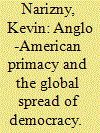

|
|
|
|
|
| Publication |
2012.
|
| Summary/Abstract |
For the past three centuries, Great Britain and the United States have stood in succession at the apex of the international hierarchy of power. They have been on the winning side of every systemic conflict in this period, from the War of the Spanish Succession to the Cold War. As a result, they have been able to influence the political and economic development of states around the world. In many of their colonies, conquests, and clients, they have propagated ideals and institutions conducive to democratization. At the same time, they have defeated numerous rivals whose success would have had ruinous consequences for democracy. The global spread of democracy, therefore, has been endogenous to the game of great power politics.
|
|
|
|
|
|
|
|
|
|
|
|
|
|
|
|
| 2 |
ID:
158258
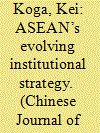

|
|
|
|
|
| Summary/Abstract |
This article argues that a change in institutional strategy enables The Association of Southeast Asian Nations (ASEAN) to manage its great power relations and prevent their abrupt political intrusion into the region by providing the policy options of pursuing institutional balancing, bandwagoning, hedging, or co-option. ASEAN’s strategy is not only to choose optimal policy under a changing security environment, but also to create an institutional division of labour by proliferating ASEAN-led institutions to ensure, as far as possible, regional autonomy and Member States’ security. Changes in ASEAN’s institutional strategy occur when its Member States expect a change in the regional distribution of power. However, due to constraints created by the existing institutional design it is difficult to make any drastic alteration to the institutional strategy unless a radical change in the regional power configuration occurs. This article examines the cases of East Asia Summit and ASEAN Defence Ministers Meeting (ADMM)/ADMM-Plus during the period 2005–2016, the comparison of which illuminates the causes and processes of their strategy change and helps to deepen our understanding of the roles of regional security institutions.
|
|
|
|
|
|
|
|
|
|
|
|
|
|
|
|
| 3 |
ID:
142253
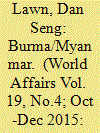

|
|
|
|
|
| Summary/Abstract |
Dan Seng Lawn scrutinises how the pursuits of great powers throughout history for regional influence have shaped the political matrix of Burma. He retraces the rise and fall of various Chinese dynasties, the coming of the British and their intense rivalry with the French and Burma’s incorporation into the British Empire. He also examines the current political scenario marked by the increasing rivalry between China and India in their quest for regional supremacy.
|
|
|
|
|
|
|
|
|
|
|
|
|
|
|
|
| 4 |
ID:
181653
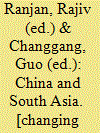

|
|
|
|
|
| Publication |
Oxon, Routledge, 2022.
|
| Description |
xxvi, 277p.: figures, tableshbk
|
| Series |
Routledge Critical Perspectives on India and China; 01
|
| Standard Number |
9781032234212
|
|
|
|
|
|
|
|
|
|
|
|
Copies: C:1/I:0,R:0,Q:0
Circulation
| Accession# | Call# | Current Location | Status | Policy | Location |
| 060085 | 327.51054/RAN 060085 | Main | On Shelf | General | |
|
|
|
|
| 5 |
ID:
126977
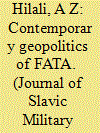

|
|
|
|
|
| Publication |
2013.
|
| Summary/Abstract |
In the post-9/11 era, the international strategic and political culture changed. The notion of 'global Jihad' became popular. The prevalence terrorist violence legitimized US interventions in Afghanistan. It further expanded to Pakistan's Federally Administered Tribal Areas (FATA) making it the chessboard of great power politics. The United States and NATO have launched military operations against the Taliban and al-Qaeda network. It blamed Pakistan for providing a safe haven to militants in its tribal belt. It is a fact that foreign intervention has become the main catalyst for militancy. The War on Terror is a 'bleeding wound' for Pakistan and people perceive that Islamabad should disassociate from the US-led war because it is against the national interest of the country.
|
|
|
|
|
|
|
|
|
|
|
|
|
|
|
|
| 6 |
ID:
188123
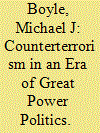

|
|
|
|
|
| Summary/Abstract |
How should the United States recalibrate its counterterrorism policy for an era of great power competition? With the end of unipolarity, the United States cannot fight terrorists and compete with Russia and China with equal energy, but must instead make hard choices about its priorities and resources. Among those hard choices are what to do with the web of counterterrorism partnerships with other governments that have formed in the post- 9/11 era. This article proposes three broad principles—linkages, license, and legitimacy—that the United States can use to evaluate its policy and these partnerships, with the aim of recasting U.S. counterterrorism policy for an era of great power competition.
|
|
|
|
|
|
|
|
|
|
|
|
|
|
|
|
| 7 |
ID:
110148
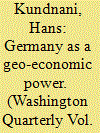

|
|
|
| 8 |
ID:
180364
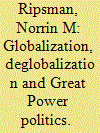

|
|
|
|
|
| Summary/Abstract |
Commercial liberalism would suggest that whereas globalization was conducive to great power cooperation—or at least moderated competition—deglobalization is likely to ignite greater competition amongst the Great Powers. In reality, however, the picture is much more complex. To begin with, the intense globalization of the 1990s and 2000s is not responsible for moderating Great Power tensions; instead, it is itself a product of the security situation resulting from the end of the Cold War. Furthermore, while globalization did serve to reinforce cooperation between the United States and rising challengers, such as China, which sought to harness the economic gains of globalization to accelerate their rise, it also created or intensified fault-lines that have led to heightening tensions between the Great Powers. Finally, while we are currently witnessing increasing tensions between the US and both China and Russia, deglobalization does not appear to be the primary cause. Thus, geoeconomic conditions do not drive security relations; instead, the geoeconomic environment, which is itself influenced by Great Power politics, is better understood as a medium of Great Power competition, which may affect the character of Great Power competition and its intensity, but does not determine it.
|
|
|
|
|
|
|
|
|
|
|
|
|
|
|
|
| 9 |
ID:
135084
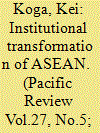

|
|
|
|
|
| Summary/Abstract |
Many international relations (IR) scholars discuss whether the Association of Southeast Asian Nations (ASEAN) possesses institutional utility in maintaining security in Southeast Asia or East Asia. While this has important implications for both academics and policy-makers, ASEAN's role has been too often evaluated in terms of what has persisted within the association rather than what changed. Yet, exploring the causes and processes of institutional transformation are particularly important because they have made ASEAN expand its security utility by creating security dialogues and fostering security cooperation in the region. In this context, the crucial question is: when and how has ASEAN changed?
Focusing on the causes and processes of institutional transformation which have occurred within ASEAN, this article explores ASEAN's transformation from 1968 to 1976, by using a theoretical model, developed from historical institutionalism and the punctuated equilibrium model. Applying this approach to institutional transformation of ASEAN in the political-security field, three transformation processes are constructed. First, ASEAN member states’ expected changes in the external security environment triggered internal discussions regarding ASEAN's political-security function; second, these internal political discussions fostered institutional consolidation of ASEAN during this period; and third, such direction of institutional transformation was fundamentally guided by ideas provided by institutional norm entrepreneurs (INEs), especially Malaysia's neutrality proposal.
In particular, this article examines the process of ASEAN's creation of the Zone of Peace, Freedom, and Neutrality (ZOPFAN) in 1971, and the Treaty of Amity and Cooperation (TAC) and the Bali Concord in 1976, and argues that this model shed light on the significance of ZOPFAN that created a foundation of TAC and the Bali Concord, for which conventional wisdom has dismissed as an insignificant institutional concept by academics and practitioners.
|
|
|
|
|
|
|
|
|
|
|
|
|
|
|
|
| 10 |
ID:
186926
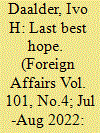

|
|
|
| 11 |
ID:
186110
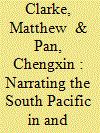

|
|
|
|
|
| Summary/Abstract |
Once considered a bunch of “small islands in a far sea” by outside powers, the South Pacific now looms increasingly large on the global geopolitical landscape, attracting the strategic attention of an array of great powers. This has prompted many scholars and commentators to focus on the rise of great power rivalry in the region. Yet, with few exceptions, the existing literature has paid little attention to how the regional dynamics are framed by the dominant narrative of great power politics in the first place and how as a result it has failed to adequately consider alternative voices, concerns and narratives from within the region. This Special Issue aims to tentatively address this neglect by questioning the unreflective narration of regional power dynamics as mere “great power politics” and by highlighting the competing narratives about this region and their policy implications for conducting relations between the South Pacific and “outside powers”. In doing so, it seeks to provide a new critical and self-reflective angle for the debate on the South Pacific. This article first examines the extent to which “great power politics” reflects the reality of the power dynamics in the South Pacific. It then explains why it is important to focus on the theme of narratives and to understand their socially constitutive role in producing knowledge and shaping reality. The third section briefly introduces the five articles in this Issue and outlines their contributions.
|
|
|
|
|
|
|
|
|
|
|
|
|
|
|
|
| 12 |
ID:
151943
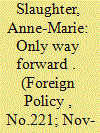

|
|
|
| 13 |
ID:
173231
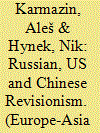

|
|
|
|
|
| Summary/Abstract |
The essay investigates the revisionism of great powers, namely Russia, the United States and China. We study intermestic configurations, linking domestic populism, the presidential power of national leaders as expressed by their strategic narratives, and each state’s international revisionist posture. In each case, we identify a different style of revisionism: Russia’s ‘guerrilla’ great power revisionism, the Trumpian anti-doctrine revisionism, and China’s revisionist quest for power and status. We argue that the different revisionist trajectories of these great powers contribute to the multifaceted and uneven unmaking of global liberal internationalism and liberal norms rather than to a coherent revisionist challenge.
|
|
|
|
|
|
|
|
|
|
|
|
|
|
|
|
| 14 |
ID:
120473
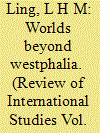

|
|
|
|
|
| Publication |
2013.
|
| Summary/Abstract |
Discourse in the US/West that a rising China threatens world order serves no national interest or international purpose. It subscribes only to Westphalian anxieties about the Other. Drawing on Daoist dialectics, this article shows how we can reframe this issue by revealing the complicities that bind even seemingly intractable opposites, thereby undermining the rationale for violence. By recognising the ontological parity between (US/Western) Self and (Chinese/non-Western) Other, we may begin to shift IR/world politics from hegemony to engagement, the 'tragedy' of great power politics to the freedom of discovery and creativity.
|
|
|
|
|
|
|
|
|
|
|
|
|
|
|
|
|
|
|
|
|